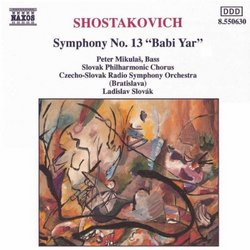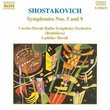| All Artists: Dmitry Shostakovich, Ladislav Slovak, Czecho-Slovak Radio Symphony Orchestra (Bratislava) Title: Shostakovich: Symphony No. 13 "Babi Yar" Members Wishing: 0 Total Copies: 0 Label: Naxos Original Release Date: 1/1/1993 Re-Release Date: 2/15/1994 Genre: Classical Style: Symphonies Number of Discs: 1 SwapaCD Credits: 1 UPCs: 730099563024, 073009956302 |
Search - Dmitry Shostakovich, Ladislav Slovak, Czecho-Slovak Radio Symphony Orchestra (Bratislava) :: Shostakovich: Symphony No. 13 "Babi Yar"
 | Dmitry Shostakovich, Ladislav Slovak, Czecho-Slovak Radio Symphony Orchestra (Bratislava) Shostakovich: Symphony No. 13 "Babi Yar" Genre: Classical |
Larger Image |
CD DetailsSimilar CDs
|
CD ReviewsShostakovich's "Babi Yar" Symphony on Naxos Robin Friedman | Washington, D.C. United States | 02/17/2004 (4 out of 5 stars) "I became interested in Shostakovich's "Babi Yar" symphony through reading a poem by a contemporary American writer, Alicia Ostriker (b. 1937), "The Eighth and Thirteenth." Ostriker's poem has been widely anthologized; it is a meditation on the two named Shostakovich symphonies and reflects on how they are related. The eighth symphony is a musical attempt to capture the horrors of the seige of Leningrad. The thirteenth "Babi Yar" symphony commemorates the Nazi massacre of over 100,000 Jews outside of Kiev. The Jews were taken to the edge of a large pit and shot. These are to horrific events of the 20th Century that Shostakovich captured in his music. Ostriker's poem relates the two symphonies by finding that the eighth expresses sorrow for the sufferings of the composer's fellow-Russians while the thirteenth shows Shostakovich's compassion for a group of which he was not a part and which has historically been subject to great prejudice in Russia -- the Russian Jews. In the thirteenth, Shostakovich reaches out beyond his own group to memorialize the sufferings of the Jewish people during the Holocaust. In the voice of tragedy, the symphonies repeat in Shostakovich's voice the theme of Beethoven's Ninth Symphony: the vision of a world filled with love and goodwill towards all people in which "all men will become brothers." Listeners who enjoy Shostakovich's music may wish to read Ostriker's fine poem.Shostakovich's 13th symphony was written in 1962 and is based, in its first movement on Yevtushenko's poem "Babi Yar". At Yevtushenko's suggestion, Shostakovich expanded the work into a five-movement symphony, each of which is based upon a Yevtushenko poem. (The poem for the fourth movement "Fears" was written especially for the symphony.) The work is written for a bass soloist and for a large bass chorus. When it appeared, the work was subjected to Soviet censorship. Shostakovich was forced to modify several lines of the poem to soften the references to Anti-Semitism.The first movement of the work, from which the symphony takes its name, is a moving lament for the murders at Babi Yar and of the ravages of Anti-Semitism. The remaining four movements of the symphony range from the serious to the sardonic. Each movement is a thinly-veiled critique of Soviet life under the communist regime: the second movement is called "humor", suggestive of ways of evading the authorities. The third movement, "At the Store" pictures the long queues of women at the commissaries for basic necessities. The fourth movement, Fears" follows on the third without pause and captures a society in which no person is free from informants. The final movement "career", likewise following the fourth movement without pause, I think captures the search for knowledge and truth as a means out of repression. The symphony ends on a quiet, reflective note.Although the symphony was written with a topical, programmatic theme, it rises beyond the subjects of its immediate concern. It is a musical lament for the horrors of the 20th Century and a plea for a kinder world.In the symphony, the melodic materials are generally given to the solo base. The male chorus comments upon and expands the melodies generally in a form approaching plainsong. The orchestra carries along the development of the work with brilliant and varied instrumentation. There are some sardonic, jeering sections, moments of reflective eloquence, and moments of strong passion. Bells and percussion figure prominently in the work, with each movement working to a climax featuring repeated clashes of cymbals.The performance on this CD is part of a cycle of the 15 Shostakovich symphonies performed by the Czeco-Slovak Radio Symphony Orchestra (Bratislava) conducted by Ladislav Slovak with Peter Mikulas as the bass soloist together with the Slovak Philharmonic Chorus. I found Mikulas and the Chorus moving and the orchestral performance at least adequate. On the whole, I thought this budget-priced CD gave a good account of this difficult symphony.I was disappointed with the lack of a text and translation of the Yevtushenko poems. In a work such as this, the texts that the composer felt important enough to set in a symphony should be provided to the listener. The program notes are reasonably detailed, but a great deal is lost with the absence of Yevtushenko's texts.Shostakovich's symphonies are a lasting legacy of the music of the twentieth century. The "Babi Yar" symphony is topical in its themes but transcends them as well in its plea for human brotherhood. This recording of the "Babi Yar" gives a good account of this great symphony that is accessible to those coming to the work anew, but the lack of a liberetto is troublesome. This CD is far from the last word on the "Babi Yar."" Really Awful Seigfrieds Hammer | Aurora, CO USA | 10/20/2003 (1 out of 5 stars) "A really poor recording. The woodwinds are out of tune, the strings are mundane and boring. Save your money. This is a very uninspired recording of the 13th Symphony by Shotakovich."
|




